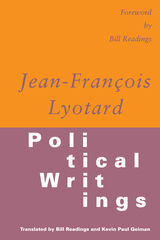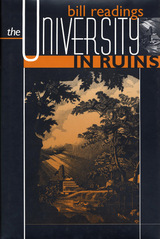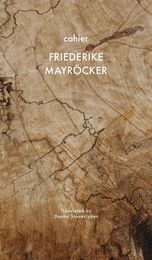

It is no longer clear what role the University plays in society. The structure of the contemporary University is changing rapidly, and we have yet to understand what precisely these changes will mean. Is a new age dawning for the University, the renaissance of higher education under way? Or is the University in the twilight of its social function, the demise of higher education fast approaching?We can answer such questions only if we look carefully at the different roles the University has played historically and then imagine how it might be possible to live, and to think, amid the ruins of the University. Tracing the roots of the modern American University in German philosophy and in the work of British thinkers such as Newman and Arnold, Bill Readings argues that historically the integrity of the modern University has been linked to the nation-state, which it has served by promoting and protecting the idea of a national culture. But now the nation-state is in decline, and national culture no longer needs to be either promoted or protected. Increasingly, universities are turning into transnational corporations, and the idea of culture is being replaced by the discourse of "excellence." On the surface, this does not seem particularly pernicious.
The author cautions, however, that we should not embrace this techno-bureaucratic appeal too quickly. The new University of Excellence is a corporation driven by market forces, and, as such, is more interested in profit margins than in thought. Readings urges us to imagine how to think, without concession to corporate excellence or recourse to romantic nostalgia within an institution in ruins. The result is a passionate appeal for a new community of thinkers.

With essays by Rosalind Krauss, Hal Foster, Norman Bryson, Victor Burgin, Martin Jay, Louis Marin, Thomas Crow, Griselda Pollock, and others, the volume is organized into sections devoted to the discipline of art history, the implications of semiotics, the new cultural history of art, and the impact of psychoanalysis. The works discussed in these essays range from Rembrandt’s Danae to Jorge Immendorf’s Café Deutschland, from Vauxhall Gardens to Max Ernst, and from the Imagines of Philostratus to William Godwin’s novel Caleb Williams. Each section is preceded by a short introduction that offers further contexts for considering the essays that follow, while the editors’ general introduction presents an overall exploration of the relation between vision and textuality in a variety of both institutional and theoretical contexts. Among other issues, it examines the relevance of aesthetics, the current concern with modernism and postmodernism, and the possible development of new disciplinary formations in the humanities.
Contributors. Mieke Bal, John Bender, Norman Bryson, Victor Burgin, Thomas Crow, Peter de Bolla, Hal Foster, Michael Holly, Martin Jay, Rosalind Krauss, Françoise Lucbert, Louis Martin, Stephen Melville, Griselda Pollock, Bill Readings, Irit Rogoff, Bennet Schaber, John Tagg
READERS
Browse our collection.
PUBLISHERS
See BiblioVault's publisher services.
STUDENT SERVICES
Files for college accessibility offices.
UChicago Accessibility Resources
home | accessibility | search | about | contact us
BiblioVault ® 2001 - 2024
The University of Chicago Press









